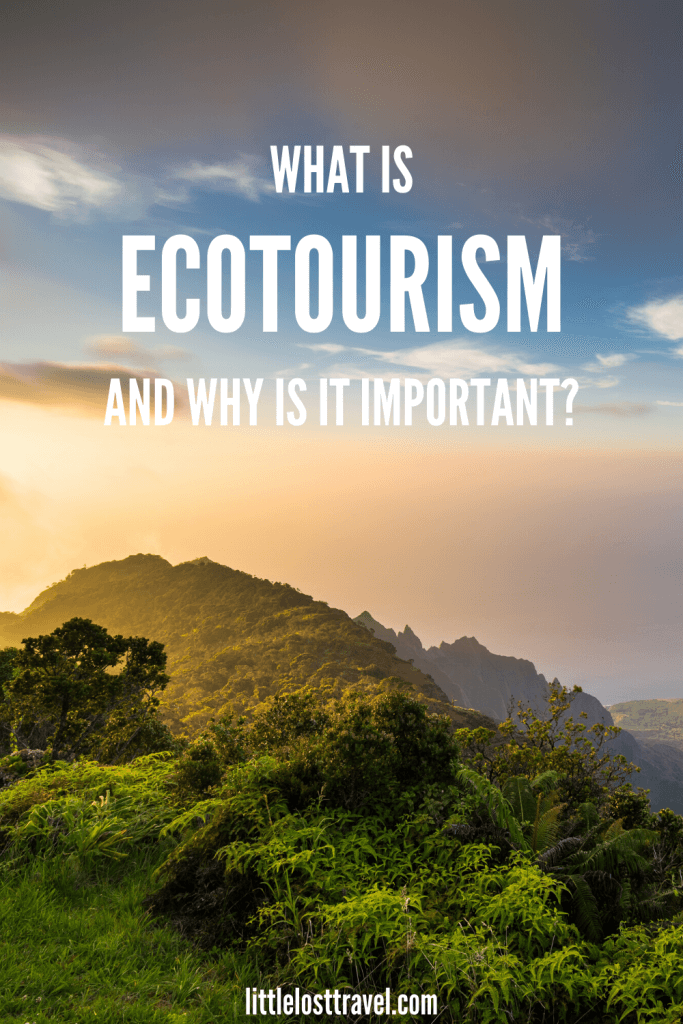We’ve become an increasingly global world and travel has never been easier.
Every year, billions of people travel internationally to the point where popular tourist destinations have started to suffer from the effects of overtourism.
The existence of some of the world’s most beautiful locations is now under threat, and it’s getting out of control.
Travel is a gift, but it needs reform. The tourism industry needs to cut back and become more sustainable to manage.
One way this can work is if travel becomes more responsible.
The answer is ecotourism.
So, what is ecotourism, and why is it important? What are the benefits of ecotourism, and how does it work?
When it boils down to it, ecotourism is about using small-scale, nature-based tourism to actively protect the environment and local communities, and educate travellers.
Read on to find out how this works.
What is Ecotourism?

First, what does ecotourism mean? To put it simply, The International Ecotourism Society (TIES) defines ecotourism as:
‘Responsible travel to natural areas that conserves the environment, sustains the well-being of the local people, and involves interpretation and education.’
The definition of ecotourism is that it’s all about active nature tourism.
It’s a small-scale, low-impact form of travel that seeks to preserve the natural world by ensuring that biodiversity, ecosystems and local communities remain protected and unspoiled.
It’s a rewarding and educational experience that improves our cultural awareness and understanding of nature.
Ecotourism destinations tend to be fragile, untouched and fairly preserved. Think islands, densely biodiverse reserves and significant cultural landmarks.
This form of travel was first introduced in the 1970s, but it only started to take off towards the end of the 1980s.
Thanks to the growing trend of people prioritising greener choices, it’s getting more popular every year.
Why is Ecotourism Important?

The purpose of ecotourism is that it helps to preserve and foster respect for some of the most beautiful environments on Earth.
Ecotourism is a sustainable way to travel. It encourages tourists to protect the environment and contribute to local communities on a deeper level than those just passing through.
This hands-on approach plays a vital part in educating travellers about some of the hardships these environments face, which can only be a good thing!
The more knowledge we have about the world, the better we can protect it from ourselves and climate change.
Overtourism is a huge problem. It puts a strain on a destination’s resources and inhabitants, and it can prevent them from safeguarding their most fragile assets.
Popular places like Machu Picchu in Peru are beginning to limit the number of tourists for fear of long-term and irreversible damage to these precious sites.
So, why choose ecotourism? It’s an antidote to unsustainable tourism.
It’s also an ally of conservation.
No one wants to visit a beach that’s covered in plastic. Ecotourism-focused attractions put environmental welfare first to ensure that they can provide excellent long-term service.
It also provides a chance to go off the beaten track and see destinations in a more authentic light.
Examples of Ecotourism

The growing trend in ecotourism has made it easier than ever to find bucket list-worthy eco-friendly tourism opportunities.
You can now do ecotourism activities that focus on working with and protecting the environment.
These can involve attractions and locally-run small group tours that consider their environmental and social impact. I love G Adventures exactly for this reason.
They are committed to ensuring that every tour they run positively impacts the community and the environment.
They have some pretty epic adventures, from wellness tours to National Geographic Journeys and everything in between!
Ecotourism can also be about where you stay on your travels. Eco-resorts and ecolodges are now popular places to stay among travellers.
The term ‘ecolodge’ is usually associated with roughing it, but it’s not the case.
Ecolodges might not have all the amenities of a standard hotel, but they have become the definition of eco-luxury – beautifully designed, comfortable and unique. You’ll be surprised at what luxuries they do offer.
Read More: 10 of the Best Ecolodges in the World
The Benefits of Ecotourism

We’ve talked about the importance of ecotourism and how it minimises negative impacts. Now, let’s dive into why we need it.
So, what is the purpose of ecotourism? Well, it:
Educates People
Ecotourism can also help inspire real change.
All it takes is for someone to spread the word about ecotourism and conservation efforts for more people to get informed, make changes from home and encourage policymakers to make a difference.
Knowledge is power.
Makes the World a More Beautiful Place
Earth is already beautiful, but some of its corners are far from pristine.
Ecotourism ensures that the world stays beautiful long-term. It protects and preserves some of the most fragile ecosystems on the planet so they can be enjoyed for generations to come.
By supporting ecotourism, you can use your travels to fight climate change and save some of the world’s most precious natural gems.
Supports Local Communities and Conservation Efforts
Ecotourism benefits the local economy by putting money into the hands of small enterprises and local communities rather than large corporations that cut corners to save money.
It can also increase wealth in impoverished communities and help sustain the livelihoods of local and rural areas.
Improves the Quality of Travel
Travel should be about enriching experiences, and ecotourism does just that. You get a much deeper cultural understanding of a destination and the chance to appreciate its natural beauty.
Ecotourism is not just good for the environment. Our own personal development and mental health reap the rewards of it too.
It allows us to connect with nature which has many benefits for our well-being.
Studies have shown that exposure to natural environments is crucial to our psychological health. In other words, ecotourism makes us feel good.
Are There Any Drawbacks?
Just like any form of tourism, ecotourism needs to be carefully managed to ensure it remains sustainable and beneficial for all. If not, some drawbacks may include:
- Overtourism: even a small influx of tourists could result in overtourism and environmental pollution in previously unvisited or remote destinations (like Antarctica)
- Negative cultural impact: it may damage cultural traditions or disrupt traditional ways of life in small communities.
- Uneven distribution of wealth: you can’t be 100% sure exactly where your money goes and who stands to benefit. Marginalized communities may still suffer.
If it’s about the Environment, Shouldn’t We Just Stay at Home?
The answer is yes and no.
It’s true that tourism accounts for roughly 8% of greenhouse gases, but it doesn’t mean we should give up travelling altogether. It’s about finding a balance which is exactly what ecotourism does.
By choosing ecotourism, you’re avoiding mass tourism in favour of an experience that matters and gives back to the planet. It’s conscious travel.
What is the Difference between Ecotourism and Sustainable Travel?

‘Ecotourism,’ ‘sustainable travel,’ ‘responsible travel,’ ‘eco-travel,’ ‘green travel,’ ‘regenerative travel,’ ‘ethical travel…’ There’s a lot of jargon about this type of travel and it all starts to get confusing.
Sustainable travel and ecotourism are similar. They both come from the idea that travel should positively impact the community and the environment.
For both terms, it comes down to making conscious decisions about eco-friendly and ethical travel.
Despite their similarities, sustainable travel and ecotourism differ slightly. The UN World Tourism Organisation defines sustainable tourism as:
‘Refer[ring] to the environmental, economic and socio-cultural aspects of tourism development. A suitable balance must be established between these three dimensions to guarantee its long-term sustainability.’
Sustainable travel is a broader term than ecotourism because it refers to a set of guidelines rather than a form of travel.
These guidelines are aimed at businesses and travel providers rather than consumers. It brings the overall principles of sustainability into the travel industry.
These principles are known as the three pillars of sustainability:
- Economic impact,
- Socio-cultural impact
- Environmental impact
The focus of these principles is to make sure that the consumer has the opportunity to make sustainable choices in all aspects of their travel, including where they stay and what they do.
The principles of ecotourism refer to a specific type of travel that focuses on conservation and the preservation of communities and ecologies.
It takes action to ensure that the natural world remains preserved and unspoiled.
It’s a blurred line between the two. You couldn’t have ecotourism without sustainable travel, and there are aspects of each in both concepts.
Read More: Two Responsible Travellers Share Their Sustainable Travel Tips
How to be an Ecotourist

Choose a Destination which is Known for its Ecotourism
Choose responsible, low-impact, small-scale travel in protected, unspoilt, and natural areas.
These are usually found in destinations that are known for their ecotourism initiatives. I’ve included a list of some of the top ecotourism places below to give you ideas.
Ecotourism is associated with somewhere biodiverse and tropical, but you can find evidence of it worldwide.
Keep reading to find some popular ecotourism destinations!
Make Sure the Ecotourism Project or Organisation is Legitimate
Ecotourism has seen a rise in popularity but so has greenwashing.
The term describes organisations that market their products as ethical and eco-friendly to appeal to consumers who want to make a positive impact on the planet.
Greenwashing organisations are far from the environmentally conscious businesses they depict themselves to be.
To avoid greenwashing, make sure that the organisation is transparent about its operations.
They should have detailed information about their environmental efforts, and they’re sometimes endorsed by a green label.
Check out my guide to picking trustworthy activities when you’re on holiday so you can get the most out of your trip.
Avoid Exploitative Voluntourism
Volunteering abroad is a popular trend among travellers wanting to make a difference in the world.
Volunteer tourism (voluntourism) is an unregulated industry. Some volunteer programmes do more harm than good.
If you’re keen to volunteer, look into how the programme operates. Think about how your skills can benefit the programme rather than turning up as an unskilled volunteer.
Avoid working in orphanages and be wary of animal ‘sanctuaries.’
Read More: Why Voluntourism Does More Harm than Good
Make Use of Local Guides
Book activities with small-scale businesses that employ local staff as guides. You’ll be rewarded with a more in-depth experience from someone who has an insider’s perspective on the area.
Travel companies that employ local staff and work on projects that give back to the community are prime examples of what to look for in ethical tourism businesses.
Leave Only Footprints
The Leave No Trace principles of responsible hiking, camping and backpacking also apply to ecotourists in nature.
Stick to designated pathways, dispose of your rubbish responsibly, leave everything as you find it and take only photos.
You should also be respectful of wildlife, observe them at a safe distance and don’t try to feed them.
Pack travel essentials that are kind to the planet too. This packing list can help.
Stay in Ecolodges that Support the Environment and the Community
The best ecolodges, eco-resorts and homestays go above and beyond to ensure their accommodation is cohesive with the natural environment and local communities.
They work with NGOs to protect the surrounding environment and employ staff from local towns and villages.
Homestays in particular can give you an in-depth cultural understanding of their way of life and you can see first-hand how tourism impacts them.
Top Ecotourism Destinations

What you see below is by no means the extensive list of all ecotourism locations.
There are projects and organisations all over the world. For example, you can stay in luxury ecolodges in Vietnam, plant trees in Scotland and participate in cultural activities in Jordan.
Here are some of the best destinations for ecotourism:
Costa Rica
Costa Rica accounts for nearly 6% of the world’s biodiversity, so it’s no surprise that the country is one of the world’s best examples of ecotourism.
Almost 40% of Costa Rica’s territory is protected, and 25% of its landmass is national parks.
The Galapagos Islands
Ecuador’s Galapagos Islands have been called a living laboratory of evolution. Some of the species of flora and fauna that live here are not found anywhere else in the world.
Ecotourism is an important part of this destination and all tourists are required to have a guide when they visit.
Palau
The archipelago of over 500 islands in the western Pacific Ocean is committed to becoming the world’s first carbon-neutral tourism destination.
All visitors to the country are required to sign the Palau Pledge, which promises to protect and respect the environment.
Palau also created the world’s sixth-largest marine sanctuary in 2015, and toxic sunscreen is banned.
Bhutan
As mandated in the constitution, 60% of Bhutan’s forests are protected, and it has the largest percentage of protected land (51%) than any other Asian country.
Bhutan has also set up a homestay programme that provides tourists with an authentic cultural experience and supports local communities.
Borneo
Borneo’s ecotourism is a huge part of the island’s impressive biodiversity. The Danum Valley Conservation Area is one of the last remaining untouched jungles in the world.
Although deforestation threatens much of Borneo, organisations like the South East Asia Rainforest Research Partnership work to find a solution that protects them and supports the local economy.
New Zealand
New Zealand is a leader in understanding the importance of nature tourism. The country has over 10,000 protected areas, including reserves and 13 national parks.
Ecotourism plays a huge part in encouraging visitors to enjoy its unique natural sites and wildlife responsibly.
Finland
The untouched landscape, paired with the deep-rooted respect for the environment, makes Finland a haven for environmental tourism.
With over 70% of land covered by forest, Finland is one of the most forested countries in the world.
Kenya
Kenya is a top ecotourism destination in Africa and owes its eco-friendly focus to its wildlife.
The country has seven habitats, about 11% of the world’s avian species and wildlife, including the ‘Big Five’ (buffalo, elephant, rhino, lion and leopard).
Visitors can participate in a variety of nature-enriched activities that support conservation and the local communities.
Read More: Forest Bathing Therapy: What It Is and How to Do It

Quick Guide to Ecotourism (video)
Want a recap? Watch this short video about why we need ecotourism.
***
To recap, the significance of ecotourism is that it:
- Educated people about nature and conservation
- It keeps the world beautiful in its natural state
- It has a lower ecological footprint than other ways to travel
- It supports local communities
- It improves the quality of travel
It’s a form of nature tourism that helps preserve otherwise fragile ecosystems, supports community development and gives visitors an enriching and immersive travel experience.
What’s not to love?
If you have any questions about ecotourism or if you would like to discuss the topic further, my inbox is always open for a chat.
And remember to check out my list of some amazing examples of ecotourism!
Looking for more sustainable travel tips?
- Top Sustainable Travel Tip That Will Save the World
- 15 Best Ethical Animal Experiences Around the World
- 9 Amazing Ecotourism Activities To Do Around The World

Pin me for later!
This post may contain affiliate / compensated links. As an Amazon Associate, I also earn from qualifying purchases. For full information, please see my disclaimer here.




This is such an important topic, especially now. If ecotourism becomes more of a focus then tourism providers will start focusing on it more as well.
It is indeed. I’m excited about how it will progress in the future!
Thanks for this guide to ecotourism! There are so many great reasons to travel this way, so thank you for helping us understand what it is and how to do it.
Thank you!
Costa Rica is one of my favorite regular destinations. One reason that I love traveling there so much is that it has never felt touristic to me. I think the government has done a great job preserving it’s authenticity for the most part. Thanks for educating me further on ecotourism.
Costa Rica is such an amazing example of a country that recognises its assets and puts them first above anything else. A true inspiration!
Fascinating read. Let’s hope travel goes in the right direction.
Thank you! Yes, let’s hope so. Things are starting to at least point that way!
Excellent round up of ecotourism. Very clearly defined and I do hope it inspires others to travel a little better.
Thank you!
Nice article.well articulated!
Thank you!